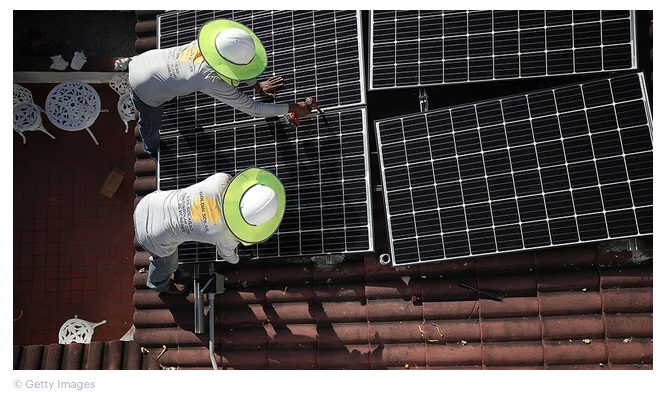By Michael Burger
News accounts over the last few days have described an ongoing legal debate within the Trump administration over whether the United States should withdraw from the Paris Agreement. Two key questions are reportedly at the center of the debate: First, does the Paris Agreement permit the United States to ratchet down the targets set forth in the Intended Nationally Determined Contribution (INDC or NDC) the Obama administration submitted to the United Nations Framework Convention on Climate Change (UNFCC)? Second, does remaining in the Paris Agreement expose the Trump administration to heightened litigation risk regarding its climate change policies?
The first question is relatively straightforward. The answer is, “Yes.” Article 4.11 of the Paris Agreement states that “A party may at any time adjust its existing nationally determined contribution with a view to enhancing its level of ambition.” As U.S. Department of State Legal Advisor Susan Biniaz and Prof. Daniel Bodansky recently wrote, this language plainly allows for countries to change their INDCs and NDCs. (Biniaz has spent 25 years representing the U.S. in international climate negotiations, including the Paris Agreement, and is an adjunct teacher here at Columbia. Bodansky is a leading expert in the field of international climate law and policy.) Indeed, according to former U.S. climate negotiator Todd Stern and others, the language was explicitly written with this possibility in negotiators’ minds. Moreover, there is nothing in the Paris Agreement that prohibits revision of an INDC or NDC to less ambitious emission reduction targets. There is nothing that provides for any supra-national body or any individual country to prevent such revision. And there are no penalties for it.
The second question is also a pretty easy one, all things considered. Remaining in the Paris Agreement does not increase litigation risk for the Trump administration as it pursues its deregulatory agenda. As Biniaz and Bodansky observe, the Paris Agreement is likely to be found a non-self executing treaty, meaning that it does not possess the force of law, and does not impose judicially enforceable obligations on the executive branch. So there cannot be a lawsuit brought in a U.S. court to make the federal government achieve its NDC, either the current one or a revised one – at least, not a successful lawsuit. This is the view of a Congressional Research Service report from 2015, which concludes that “Treaties and executive agreements that are not self-executing . . . have generally been understood to lack domestic legal effect in the absence of implementing legislation . . . . Until implementing legislation is enacted, existing domestic law concerning a matter covered by an international agreement that is not self-executing remains unchanged and controlling law in the United States.” There is no implementing legislation for the Paris Agreement. So the Clean Air Act and other federal statutes remain the law of the land, here.
Nor will remaining in the Paris Agreement inhibit Scott Pruitt as he seeks to revise or rescind the Clean Power Plan, emissions standards for motor vehicles, methane regulations for oil and gas operations, and other greenhouse gas emissions rules. The criteria that govern Pruitt’s discretion in all of those cases are set forth in the Clean Air Act, which was first written in 1965 and last revised in 1990, a full quarter century before the Paris Agreement was enacted. Pursuant to the Supreme Court’s decision in Massachusetts v. EPA, and consistent with the plain language of the statute, EPA in 2009 made a scientific judgment that GHG emissions endanger public health and welfare in the United States. With that finding in place, EPA must establish GHG emissions standards for different categories of mobile and stationary sources. Those standards must fit within the statutory definitions provided by the statute. Those definitions do not make reference to the UNFCC, the Paris Agreement, or any other international standard, and have never been interpreted to require achievement of any such commitments.
The idea that the Paris Agreement limits Pruitt’s discretion has it exactly backwards. The INDC submitted by the Obama administration appears to have been based on its determination of what was achievable within a given timeframe under the Clean Air Act. The GHG regulations enacted under the Clean Air Act were not based on the INDC. In fact, the regulations adopted by the Obama administration were themselves, taken all together, insufficient to meet the Paris commitment. Now, it would of course be desirable for domestic regulations to support national goals established through a coordinated international effort to address climate change. But it is beyond a stretch of the legal imagination to expect U.S. courts will demand such a thing in relation to the Paris Agreement.
Ultimately, the Trump administration’s main litigation risk comes not from the Paris Agreement, but from the fact of climate change, and the extent of its impacts on citizens’ lives, livelihoods, health and well-being – that is, from the ways in which it adversely affects people’s fundamental rights. Given these realities, pulling back from climate action probably raises more litigation risk than moving forward with it. Indeed, the decision to divorce the U.S. from the global effort to address the global problem of climate change, and the decision to undo federal GHG regulations, will create a void which courts may be inclined to fill, in order to ensure that people’s rights are adequately protected. This is the gist of the youth plaintiffs complaint in Juliana v. United States. There, the plaintiffs have alleged not that the United States must meet targets set forth in the Paris Agreement, but that it must establish a climate policy that is consistent with climate science, that does not violate the substantive due process rights of current and future generations, and that protects public trust resources for all. If the government is taking action to address the problem, then it at least has a defense. If it is doing nothing, and signaling an intent to undo what has been done to date, then cases like Juliana, that raise common law or constitutional claims, may well see their likelihood of success increase.




